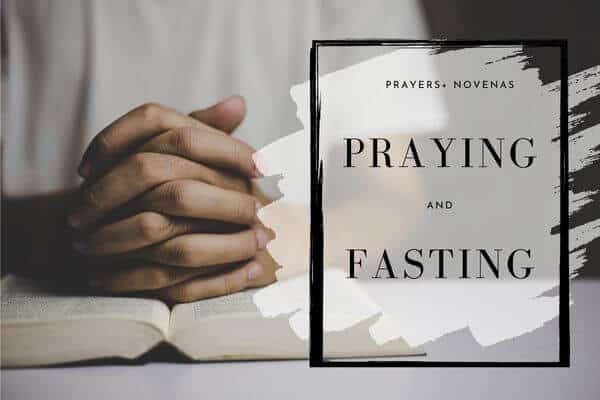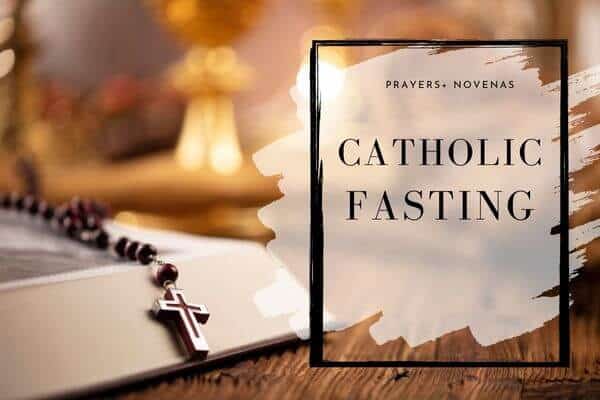Fasting is a spiritual discipline with deep biblical roots that can transform your life. All forms have the potential of helping one grow in faith toward God while also bringing transformation into other aspects of their life. This can be very spiritually rewarding!
The act of fasting can help fill you with the Holy Spirit and fasting for prayer intention can help you hear God when you are looking for an answer.

How do you fast and pray Biblically?
To fast and pray biblically, you should spend time reading the Bible and praying. You can also fast as a form of prayer, by denying yourself food or pleasure for some time as an act of self-sacrifice.
You also receive strength, wisdom, and guidance from Him during your time of fasting and prayer.
Prayer & Fasting — The Goal
Fasting and prayer are important spiritual practices. God desires when we look towards Him. When done correctly, they can help to bring a person closer to God. The goal of fasting is to deny the body of something that it desires.
This act of self-denial humbles the individual and makes them more focused on God. Just like a spiritual atomic bomb, your life won’t be the same afterward.
Prayer is a way of communicating with God. It allows His children to express their thoughts and feelings. When fasting and prayer are done together, they can be incredibly powerful.
They can help individuals to let go of their earthly desires and focus on their relationship with God. As a result, fasting and prayer can be key parts of a person’s spiritual journey.
Types of Fasting and Praying
Fasts: A daily fast means that you refrain from consuming and eating anything excluding water and usually replace those activities with God’s word.
Partially fasting: This is a technique where you stop eating a specific meal or drink. A partial fast is usually a liquid fast that removes some foods from your diet. It may involve caffeine or alcohol. The alternative form of intermittent fasting is to stop one food at least once a day.
It doesn’t need to be about avoiding solid food, fresh fruit, light juices, or something you love. Especially to start with, you can try a more selective fast. Fasting enables you to go deeper into your relationship with the Holy Spirit and God’s word.
Absolute Fasts: Absolute fasts occur when people are unable to consume anything or consume any food or beverage at all. This can also be similar to biblical fasting.
To be sincerely humble, while you are fasting, you are spending a great deal in prayer. Through the hunger pains and uncomfortable feelings.
What is fasting?
Fasting is abstaining from food or drink for a spiritual purpose.
Successful fasting will leave you physically refreshed and feel the Holy Spirit. It might sound extreme, but there are scripture references that God wanted this Holy time in your life.

Catholic Fasting
1. The forty days of Lent
Lent is a season of fasting, prayer, and repentance that lasts for forty days before Easter. During Lent, Catholics are asked to give up something that they enjoy, such as cigarettes or sweets, and to focus on prayer and doing good works.
2. Good Friday
Good Friday is the day on which Catholics remember the crucifixion of Jesus Christ. On this day, Catholics are asked to abstain from meat. Also, the two smaller meals during the day should not be bigger than the largest meal. This also counts for all the Fridays during Lent.
3. Ash Wednesday
Ash Wednesday is the first day of Lent and is a day of fasting and abstinence. On this day, Catholics are asked to abstain from meat. The same rule applies where they can have one regular-size meal and two smaller ones. Just as with lent and Good Friday, try to eat less than usual.
4. The Ember Days
The Ember Days are three days of fasting and prayer that take place each season.
They would be Wednesday, Friday, and Saturday following St Lucy’s Day (December 13th), the first Sunday in Lent, Pentecost, and Holy Cross Day (September 14th).
8 Tips for a Successful Fasting
1. Pray
Prayer will help you to stay focused on your goals for the fast and will give you the strength to persevere.
2. Set a Goal
What do you hope to accomplish through this fast? What are your intentions? Having a clear goal in mind will help you to stay on track and will make it more likely that you will be successful.
3. Choose the Right Fast
Will you abstain from all food and water? Will you do a partial fast?
4. Prepare Your Body and Mind
Before you begin your fast, it is important to prepare. This means eating light meals for a few days beforehand and avoiding any foods or activities that may tempt you during the fast.
5. Follow the Rules of the Fast
When you are fasting, it is important to follow the rules of the fast. It is also important to avoid any activities that would compromise the fast spiritually, such as gossiping or engaging in arguments.
6. Be Flexible
It is important to be flexible. If something comes up that prevents you from following through with the fast, don’t beat yourself up about it. Just get back on track as soon as possible.
7. Persevere
Fasting can be difficult. Remember why you are doing this fast. There will be times when you feel like giving up, but if you push through those times, you will be successful.
8. End the Fast Properly
When the time comes to end your fast, it is important to do so properly. This means breaking the fast gradually by eating light meals.
Why should you fast?
Catholics fast for a variety of reasons – including, but not limited to, commemorating important feast days, seeking repentance, or increasing prayer and devotion.
Fasting is an essential part of the Catholic faith because it allows us to detach ourselves from material things and focus on spiritual matters. It also allows us to empathize with those who are less fortunate than us. And finally, fasting can help us develop self-control and humility.
The Bible has a lot to say about prayer and fasting. In the Old Testament, we see examples of people fasting for nine days (1 Kings 19:8) and forty days (Exodus 34:28). Jesus Himself fasted for forty days in the desert (Matthew 4:2). And in the New Testament, we see Paul encouraging believers to fast (1 Corinthians 7:5).
When we pray, we are opening our hearts and minds to God, expressing our desires and needs. We are inviting God into our lives. When we combine prayer and fasting, we are creating a space in our lives where God can work.
We are setting aside time to focus on Him and His will for our lives. In doing so, we open ourselves up to His blessings and His guidance. By working out your spiritual fasting muscles, you can see how your faith soared higher than if you didn’t fast.
What is a Fast from Sex?
Sex is a gift from God to be enjoyed within the context of marriage. However, the Church also recognizes that there are times when it is appropriate to abstain from sexual activity.
One such time is during Lent when many Catholics choose to fast from sex as a way of deepening their spiritual lives.
The Church teaches that sex is more than just a physical act; it is also an expression of love and intimacy. As such, fasting from sex can be seen as a way of turning one’s attention towards God and away from the distractions of the world.
By abstaining from sexual activity, Catholics can focus more on prayer and reflection and grow closer to God.
Of course, not everyone is called to fast from sex during Lent. Each person must discern what is best for them, with the guidance of the Holy Spirit. But for those who do feel called to this practice, fasting from sex can be a powerful way to follow the Lord’s command.
The Holy Spirit leads you to fast.
What happens When You Fast and Pray?
When Catholics fast, they typically abstain from food for a set period. During this time, they focus on prayer and reflection. Intercessory prayer is important here.
From a Catholic perspective, fasting is seen as a way to mortify the flesh and draw the spirit closer to God. It is also seen as a way of gaining intercession from saints. In addition, fasting is thought to help discipline the body and mind, making it easier to resist temptation and overcome sinful urges.
For those who can fast regularly, it can be an effective tool for spiritual growth. However, it is important to remember that fasting should never be done to the point of harm or weakness. Catholics should always consult with their priest or spiritual director before embarking on a fast.
First, seek God and consider the great spiritual awakening that will happen after complete successful fasting.

Adele
Sunday 23rd of July 2023
I have prayed and prayed and today my preacher said have you fasted? I never thought that it would have to come to this. I did not know that I needed to starve myself for GOD to hear me? Seems fishy...... I do not want to stop eating this is weird why would GOD want someone to go without food when there are so many people starving involuntarily.